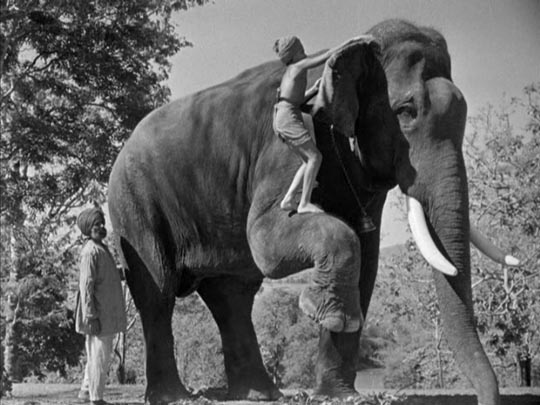Post by Brad Nelson on Jun 23, 2020 6:35:30 GMT -8
The Criterion Channel has a “Matinee” section, so I’ll be reviewing a few of these. First off is 1937’s Elephant Boy starring Sabu. You know you’ve made it in entertainment when you are known by just your first name. This black and white movie is based on Rudyard Kipling's "Toomai, of the Elephants.”
A film like this should be watched within the context of 1936 film making. I absolutely loved this movie. But it is somewhat of a rough, patched-together work. Clearly there is (as you see in the opening credits) a first-unit director filming some stuff (and perhaps using different film stock) and the second-unit director filming other scenes. One reviewer writes, “This was Flaherty's only narrative film - I expect that he directed the nature parts of the film and Zoltan Korda directed the actors.” The point is, there are clearly two different things going on.

You’ll also get film that is speeded up and looped. There may even be some stock footage thrown in. But what holds it together is the interest of the elephants themselves (they are amazing creatures) and the story of the young boy who wants to be an “elephant hunter.” And that means he wants to succeed his father as a hunter. In this case, “hunter” means hunter of wild elephants in order to capture them and domesticate them, although there may have been some actual tiger-hunting as well involved in the profession.
Sabu had great success in film at the time, also starring in The Drum, The Thief of Bagdad, and Jungle Book (which I’m watching now). A commenter notes a little of his bio:
It’s hard to describe the acting of Sabu. One review calls it “natural and authentic.” I’d call it pleasantly amateurish and himself physically a marvel, especially some of the stunts he does with his elephant. Enhancing the movie is the location shooting that one reviewer noted was “personally granted by the Maharaja of Mysore on his private lands.” And that is a large draw to the movie. It’s really a mix of the story of Sabu and a documentary on the life and times of elephants in India.
Enhancing the film is a pretty decent soundtrack. Watch this before it’s scrubbed from the channel by the Communists for its overt “colonialism.”

A film like this should be watched within the context of 1936 film making. I absolutely loved this movie. But it is somewhat of a rough, patched-together work. Clearly there is (as you see in the opening credits) a first-unit director filming some stuff (and perhaps using different film stock) and the second-unit director filming other scenes. One reviewer writes, “This was Flaherty's only narrative film - I expect that he directed the nature parts of the film and Zoltan Korda directed the actors.” The point is, there are clearly two different things going on.

You’ll also get film that is speeded up and looped. There may even be some stock footage thrown in. But what holds it together is the interest of the elephants themselves (they are amazing creatures) and the story of the young boy who wants to be an “elephant hunter.” And that means he wants to succeed his father as a hunter. In this case, “hunter” means hunter of wild elephants in order to capture them and domesticate them, although there may have been some actual tiger-hunting as well involved in the profession.
Sabu had great success in film at the time, also starring in The Drum, The Thief of Bagdad, and Jungle Book (which I’m watching now). A commenter notes a little of his bio:
After distinguished military service in World War II he resumed his film career, but he became endlessly confined for years playing ethnic roles in undistinguished minor films, BLACK NARCISSUS (1947) being the one great exception. His final movie, Walt Disney's A TIGER WALKS (1964) was an improvement, but it was too late. Sabu had died of a heart attack in late 1963, only 39 years of age.
It’s hard to describe the acting of Sabu. One review calls it “natural and authentic.” I’d call it pleasantly amateurish and himself physically a marvel, especially some of the stunts he does with his elephant. Enhancing the movie is the location shooting that one reviewer noted was “personally granted by the Maharaja of Mysore on his private lands.” And that is a large draw to the movie. It’s really a mix of the story of Sabu and a documentary on the life and times of elephants in India.
Enhancing the film is a pretty decent soundtrack. Watch this before it’s scrubbed from the channel by the Communists for its overt “colonialism.”
